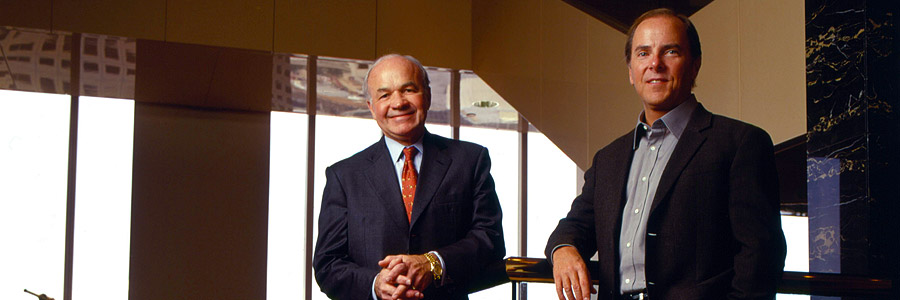
Enron: The Smartest Guys In The Room

ENRON: THE SMARTEST GUYS IN THE ROOM (DOCUMENTARY)
Magnolia Pictures / Lionsgate UK
Release date: August 28th, 2006
Certificate (UK): 15
Running time: 109 minutes
Writer and director: Alex Gibney
Cast: Kenneth Lay, Jeffrey Skilling, Andy Fastow
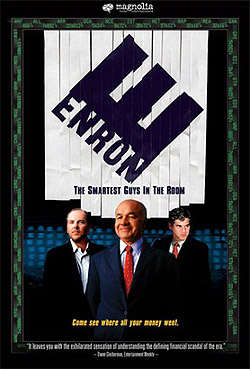
Never before had the stench of corporate greed and corruption sickened the stomachs of the general public the way it did with Enron. In what seemed like something out of Oliver Stone’s Wall Street (1987), the company, which looked poised to take over the world with their innovative market-making ideas, suddenly became the story of America’s (then) largest corporate bankruptcy. What surprised us in all of this was, not only how they managed to get away with it for so long, but that Enron’s top bosses walked away with millions while some 20, 000 employees lost everything from their jobs and homes to their 401(k)’s.
Enron: The Smartest Guys in the Room is a documentary by Alex Gibney based on the book of the same name by Fortune reporters Bethany McLean and Peter Elkind. It explores the company’s 2001 collapse but it also digs deep into the histories of its founder Kenneth Lay, former President and CEO Jeffrey Skilling, former CFO Andrew Fastow and former CEO of Enron North America J. Clifford Baxter.
Beginning with the news reports of Baxter’s apparent suicide when he was found dead in his car on January 25th, 2002 with a single gunshot wound to the head, we’re asked “Who was responsible for the downfall of Enron?” To answer that question it’s necessary to go back in time.
Prior to their collapse, Enron was America’s seventh largest corporation, valued at almost $70billion. It was the company that could do no wrong. As market makers and market leaders, they bought and sold energy and were praised as being a new business model. Yet beneath the façade they projected, they were rotten to the core and cooking the books to show record profits when in fact they were making record losses.
Beyond the financial issues, Enron: The Smartest Guys in the Room also raises the issue of a political conspiracy as the company were also known to have been the largest contributor to the presidential campaign of George W. Bush. As we then move on to looking at Lay’s early life we learn about him being among the first to start championing for deregulation.
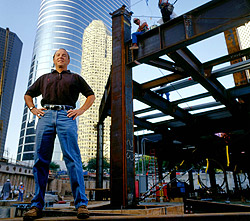
Deregulation is the process by which the government reduces its role and allows an industry greater freedom in how it operates. This would help Lay found Enron in 1985 through a merger of vast gas networks and pipelines. Lay thought Enron would be poised to take advantage of the government’s decision to let gas prices float with the currents of the market and in his view, deregulation was from a standpoint of how much money he thought could be made.
He wasn’t the only one who held this view and it didn’t take him long to find some friends in the Texas oil business – the Bush family – who were also keen to get government out of the oil business by getting into government themselves. As Enron took America by storm in the proceeding years, the film outlines how they managed to dupe us all. Off-shore accounts, phoney books and a trail that lead from the company treasurer Tom Mastroeni to a mysterious Lebanese man, M. Yass (my ass), that no one could find. A lot of the company’s profits were also moving into people’s personal accounts and while this was all brought to the attention of Lay at board meetings, his response was to change nothing. Instead of reducing risk he increased it and encouraged traders to keep making millions for Enron as it was the only side of the company making them any money. It became clear that pretty soon traders had gambled away all of Enron’s reserves.
Despite this, their confidence and arrogance grew and their slogan “Ask why” eventually became “Ask why, asshole” after Skilling was quizzed on why Enron doesn’t published their profits like every other trading company, and got the word “asshole” as response.
Bethany McLean, who at the time was writing an article for Fortune magazine on the company, says:
Fastow, we learn, was a man of very grey morals whom Skilling had handpicked as CFO. His job was to cover up the fact that Enron was becoming a fantasy financial land, losing money year after year but reporting profits. In short, the books were defying the laws of financial gravity.
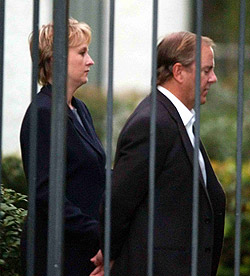 Skilling arrested
Skilling arrestedSkilling probably knew Fastow would have no problem dipping into the accounts to line his own pockets. He would later become their scapegoat after scooping up $60 million for himself through partnerships that did deals with Enron. [1]
Like Lay and Skilling, Fastow profited from his greed and the greed of many Wall Street investment banks such as CitiBank and Merrill Lynch. In its final months before the bubble really burst, insiders sold off $1billion of their stock and shredded much of the evidence to go with it. A further $2billion in pensions and retirement funds would disappear leaving us to ask “Was Enron the work of a few bad men or the dark shadow of the American dream?”
When you have a look at Enron traders involvement in the California electricity crisis you start to believe it might even be something in the water they’re drinking that made them so drunk on power.
It’s an incredible documentary and it covers a lot of ground. So much has been said about the rise and fall of Enron but little has really been understood about the guys that played major parts in how it happened. Enron: The Smartest Guys in the Room puts the focus on them with rare footage, archive reports and interviews with many leading financial experts including McLean and former Enron employees.
Through this we get a look into the belly of one of America’s ugliest beasts and while Enron’s downfall created a ripple effect, it wasn’t enough to deter corporate greed, especially in light of the collapse of Worldcom in 2002, Lehman Brothers in 2008 and the ensuring financial crisis. Those who are really accountable will never know the meaning of justice but does that make them the smartest men in the room?
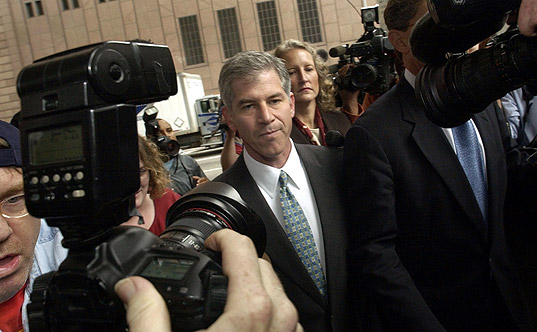

Patrick Samuel
The founder of Static Mass Emporium and one of its Editors in Chief is an emerging artist with a philosophy degree, working primarily with pastels and graphite pencils, but he also enjoys experimenting with water colours, acrylics, glass and oil paints.
Being on the autistic spectrum with Asperger’s Syndrome, he is stimulated by bold, contrasting colours, intricate details, multiple textures, and varying shades of light and dark. Patrick's work extends to sound and video, and when not drawing or painting, he can be found working on projects he shares online with his followers.
Patrick returned to drawing and painting after a prolonged break in December 2016 as part of his daily art therapy, and is now making the transition to being a full-time artist. As a spokesperson for autism awareness, he also gives talks and presentations on the benefits of creative therapy.
Static Mass is where he lives his passion for film and writing about it. A fan of film classics, documentaries and science fiction, Patrick prefers films with an impeccable way of storytelling that reflect on the human condition.
© 2022 STATIC MASS EMPORIUM . All Rights Reserved. Powered by METATEMPUS | creative.timeless.personal. | DISCLAIMER, TERMS & CONDITIONS
HOME | ABOUT | CONTACT | TWITTER | GOOGLE+ | FACEBOOK | TUMBLR | YOUTUBE | RSS FEED
CINEMA REVIEWS | BLU-RAY & DVD | THE EMPORIUM | DOCUMENTARIES | WORLD CINEMA | CULT MOVIES | INDIAN CINEMA | EARLY CINEMA
MOVIE CLASSICS | DECONSTRUCTING CINEMA | SOUNDTRACKS | INTERVIEWS | THE DIRECTOR’S CHAIR | JAPANESE CINEMA





